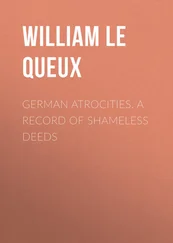William Le Queux - Whither Thou Goest
Здесь есть возможность читать онлайн «William Le Queux - Whither Thou Goest» — ознакомительный отрывок электронной книги совершенно бесплатно, а после прочтения отрывка купить полную версию. В некоторых случаях можно слушать аудио, скачать через торрент в формате fb2 и присутствует краткое содержание. Жанр: foreign_prose, на английском языке. Описание произведения, (предисловие) а так же отзывы посетителей доступны на портале библиотеки ЛибКат.
- Название:Whither Thou Goest
- Автор:
- Жанр:
- Год:неизвестен
- ISBN:нет данных
- Рейтинг книги:5 / 5. Голосов: 1
-
Избранное:Добавить в избранное
- Отзывы:
-
Ваша оценка:
- 100
- 1
- 2
- 3
- 4
- 5
Whither Thou Goest: краткое содержание, описание и аннотация
Предлагаем к чтению аннотацию, описание, краткое содержание или предисловие (зависит от того, что написал сам автор книги «Whither Thou Goest»). Если вы не нашли необходимую информацию о книге — напишите в комментариях, мы постараемся отыскать её.
Whither Thou Goest — читать онлайн ознакомительный отрывок
Ниже представлен текст книги, разбитый по страницам. Система сохранения места последней прочитанной страницы, позволяет с удобством читать онлайн бесплатно книгу «Whither Thou Goest», без необходимости каждый раз заново искать на чём Вы остановились. Поставьте закладку, и сможете в любой момент перейти на страницу, на которой закончили чтение.
Интервал:
Закладка:
“Quite right, quite honourable!” murmured the poor General, dreading the inevitable end of this discourse. Maurice was stating the case, rather as if he were addressing a jury, but there was no doubt he meant business. Even a man of his cautious temperament could now safely allow himself the luxury of matrimony, that was evident from this preamble.
“It has always been my one thought to marry Isobel, assuming that she would have me, the moment I was in a position to take a wife. That moment has now arrived; I have no fears of the future. The question arises, am I too late?”
The General was terribly embarrassed by this direct question. He was a most straightforward man, he loathed subterfuge.
But what was he to do? The engagement of his daughter to Guy Rossett was a secret one. He was, in honour bound, to give neither of them away.
He temporised weakly. “Have you spoken to Isobel about this?”
“No,” came the answer. “I thought it was right to approach you first.”
“Exactly, exactly,” stammered the poor father. “Very right and proper, of course. But you had better put it to Isobel, and see what she says. Of course, you understand there is no opposition on my part.”
Farquhar looked at him keenly. Yes, Moreno’s suspicions were justified. There was a secret engagement. The General had thrown the onus on his daughter. She could tell as much or as little as she pleased.
“Thanks,” he said quietly. “I will speak to Isobel to-morrow morning.”
The next day, in a little sheltered arbour in the not too extensive garden, he asked his cousin to marry him. He explained to her, as he had explained to her father, the reasons which had held him back.
She listened to him with composure. She was dimly aware that, a few years ago, this declaration of love would have set her cheeks aflame, her heart beating. To-day, it left her regretful, but cold.
“I am dreadfully sorry, Maurice. I am very, very fond of you, but not in that way. I look upon you as a brother, a very dear brother.”
There was decision and finality in the low, gentle tones. It was a bitter disappointment. He had always fancied in his masculine optimism that Isobel was waiting ready to fall into his arms, when he had made up his mind to ask her.
It was a bitter disappointment, but he bore it with his usual stoicism. Ambition was the greater factor in his life; love would always play a subordinate part. Still, Isobel’s refusal had taken something away that could never be replaced.
There was a long pause. He was the first to break the silence.
“Your affections are engaged. You are in love with somebody else?”
A vivid flush overspread the fair face. “It is quite true, I love somebody else.”
“The man you were dining with, Guy Rossett?” replied Farquhar quietly.
“Ah, you have guessed! But it is quite a secret. My father knows. His sister knows. His father is obstinate and prejudiced; he wants him to marry a woman in his own world. We are waiting for his consent.”
“I quite understand,” said Farquhar gloomily. “I am too late, I can see. Honestly, Isobel, had I asked you, say, a year ago, would your answer have been different?”
Her frank and candid gaze met his steadfast glance. “I fancy I should have said yes, Maurice. But I am not certain it would have been real love; you see, I have known so few men. Guy has revealed a new world to me.”
Farquhar sighed. He was eloquent enough in the courts, but he was dumb in the presence of women. This handsome young diplomatist had spoken to her in a language that she readily understood.
He silently said good-bye to his dream, the fair dream of the future which was to be glorified by Isobel Clandon’s gracious presence.
“So that is all over. Well, Isobel, I hope you will always allow me to be your very good friend.” She reached out her hand impulsively and laid it on his.
“Oh, yes, please, Maurice. You will always be a dear, kind brother, won’t you?”
“Perhaps some day I may be able to help you. I have just learned there is some danger threatening Guy Rossett.”
Her face blanched. She turned to him an imploring glance.
“Danger threatening Guy. Oh, please tell me, quickly.”
With a bitter pang, he realised in that anguished utterance a full sense of the love which he had lost, of the youthful heart which he had allowed another man to capture.
In a few brief sentences, he told her what Moreno had related to him.
Chapter Five
At the period at which this story opens, there stood in Gerrard Street, Soho, a small, unpretentious restaurant, frequented almost exclusively by foreigners. Over the front was written the name of Maceda.
Luis Maceda, a tall, grave man of dignified aspect, with carefully trimmed beard and moustache, was the proprietor. He was a Spaniard, with the suave and courteous manners of that picturesque nation. The majority of his customers were his compatriots. The few Englishmen who found their way there spoke highly of him and the cuisine. At the same time, one or two of the prominent officials of the Secret Service kept a wary eye upon Maceda and his friends.
It was about half-past six on the evening following the interview between Moreno and Farquhar that Maceda, grave, upright, and dignified, looking younger than his fifty years, stood near the entrance door of the small restaurant, awaiting the arrival of early diners.
He was one of the old-fashioned type of restaurant keepers who kept a vigilant eye on his subordinates, went round to every table, inquiring of his patrons if they were well served. In short, he made his customers his friends.
Through the open doors entered Andres Moreno. He lunched and dined at a dozen different places, but usually twice a week he went to Maceda’s. The cuisine was French, to suit all tastes, but there were always some special Spanish dishes, to oblige those who were still Spaniards at heart.
The pair were old friends. Moreno extended his hand.
“How goes it, Maceda? But it always goes well with you. You look after your patrons so well.”
For a few moments the two men conversed in Spanish, which Moreno, through his father, could speak perfectly. Then, after a pause, the journalist spoke a single word – it was a password, that Maceda understood instantly.
A sudden light came into the proprietor’s eyes. He smiled genially, but gravely, as was his wont.
“So you are with us, at last,” he said. “A thousand welcomes, my friend. We want men like you. I was told there would be a new member to-night, but the name was not divulged. This way.”
The restaurant keeper led him up a narrow staircase – the house was a very old one – to a big room on the second floor. A long table stood in the middle of the apartment, on which were set bowls of flowers and dishes of fruit. Moreno looked around gratefully. As far as creature comforts went, he was going to have a pleasant evening. Maceda was evidently going to do his best.
Maceda pointed to a little side-room.
“It is there the initiation will be performed at seven. At half-past, dinner will be served. After dinner, the business of the meeting will take place. You are a bit early. I know this much, that you are here on the introduction of Emilio Luçue.”
“Quite right,” answered Moreno easily. “It was Luçue who persuaded me to the right way.”
Maceda raised his hands in admiration at the mention of that name.
“Ah, what a man, what a genius!” he cried in fervent tones. “If our cause ever triumphs, if the world-wide revolution is ever brought about – and sometimes, my friend, I feel very disheartened – it is men like Luçue who will make it a possibility.”
“Trust to Luçue,” answered Moreno, in his easy way. “If he can’t do it, nobody can.”
Читать дальшеИнтервал:
Закладка:
Похожие книги на «Whither Thou Goest»
Представляем Вашему вниманию похожие книги на «Whither Thou Goest» списком для выбора. Мы отобрали схожую по названию и смыслу литературу в надежде предоставить читателям больше вариантов отыскать новые, интересные, ещё непрочитанные произведения.
Обсуждение, отзывы о книге «Whither Thou Goest» и просто собственные мнения читателей. Оставьте ваши комментарии, напишите, что Вы думаете о произведении, его смысле или главных героях. Укажите что конкретно понравилось, а что нет, и почему Вы так считаете.












